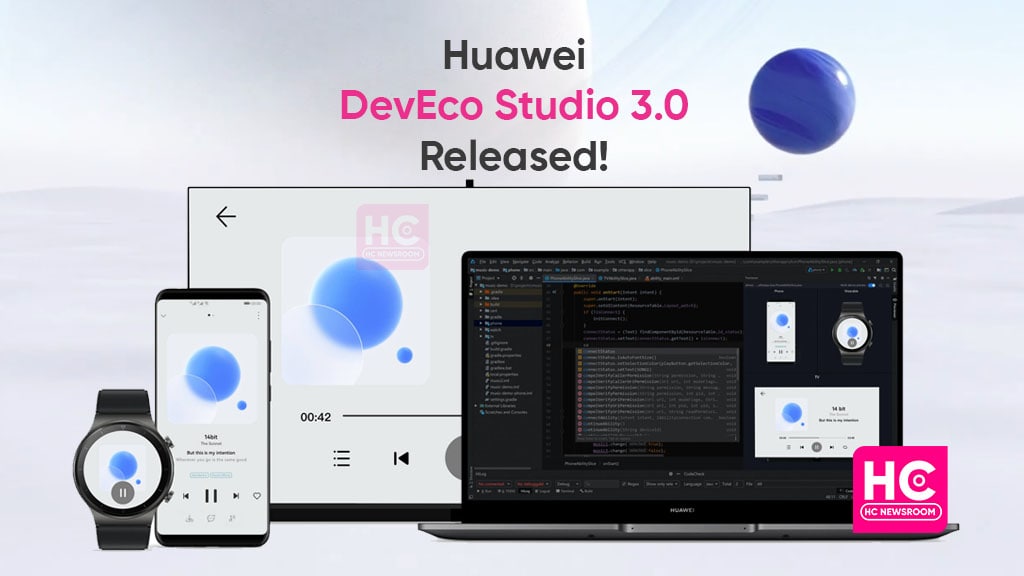HarmonyOS
Huawei DevEco Studio 3.0 released with support for HarmonyOS 3.0 services

After four beta versions, Huawei has finally unveiled the DevEco Studio 3.0 release with ultimately HarmonyOS 3.0 support. Alongside this, the all-new edition welcomes several services that enhance the overall development of programs and applications.
Huawei DevEco Studio 3.0 is a one-stop integrated development tool for HarmonyOS applications and services. Further, it also supports the OpenHarmony application and service production. It is a capable software that provides thoughtful aptitudes to developers so that they can conduct development-related tasks.
So far, the software program went through numerous internal tests and beta iterations. And finally, the company has brought a more stable version with new features and the effective support of HarmonyOS 3.0 applications and services.
Ultimately, now the latest HarmonyOS 3.0 applications and services will support the APIs (Application Programming Interface) from 4 to 8 versions. Besides, the OpenHarmony SDK supports API 8 and 9 builds.
On the other hand, the new software program provides solutions to various problems. For instance, flicking interface, repeated disconnections, display width of P50 remote emulator, and other issues of the code-oriented projects.
You can check the new enhancements and fixes, below.

DevEco Studio 3.0 Features and Fixes
Enhanced Features
- Support the development of HarmonyOS 3.0 applications and services.
- Enhanced the editor’s capabilities and supports static analysis of C/C++ code. For instance, real-time detection of unreachable codes, and unused function parameters in C/C++ files, making coding more standardized and efficient.
- Enhanced the ability of the test framework. Improved the execution efficiency of the test framework significantly for the projects of JS/eTS API Version 8 and 9. At the same time, optimizes the test framework template to improve the readability of the template code.
- Optimized the C++ debugging capability. Supports right-clicking the C++ stack frame to jump into the assembly and perform assembly-level single-step debugging.
Fixes
- Solved the problem that the configuration wizard interface will flicker when creating a project. Further, adds a module, ability, page, etc under the dark theme.
- Solved the problem of creating a low-code project, adding a button component, and debugging the code after binding an event. When entering a breakpoint, the execution sequence of the breakpoint will be out of order.
- Fixed an issue where modifying the properties or interface parameters of some components may cause the previewer engine to crash.
- Solved the problem after referencing a custom component in the npm package in the HTML code of the module. Adding or deleting a component, and saving it with Ctrl+S, the preview interface will display a white screen, and you need to click the refresh button to restore it.
- Solved the problem of repeated disconnection and automatic reconnection after the P50 remote simulator is connected to the WLAN network.
- Solved the problem that the display width of the P50 remote emulator is compressed, and the display effect of fonts and icons is compressed.
- Solved the problem that the P50 remote emulator stuck after starting.
- Solved the problem that the P50 remote simulator cannot obtain temperature and time data and cannot run UITest when running an application with a service card.
- Solved the problem that the local simulator starts abnormally with a small probability, indicating that the HDC tool is not running normally.
- Solved the problem that the pickFirst or pickLast processing mechanism was inaccurate when Library dependencies conflicted.
- Solved the problem that the application’s configuration file Schema reported an error and could not jump to a specific code block.
- Solved the problem that OpenHarmony’s C++ project cannot enter breakpoints probabilistically.
- Solved the problem that Hilog log printing fails in small probability during debugging.
(Source)






